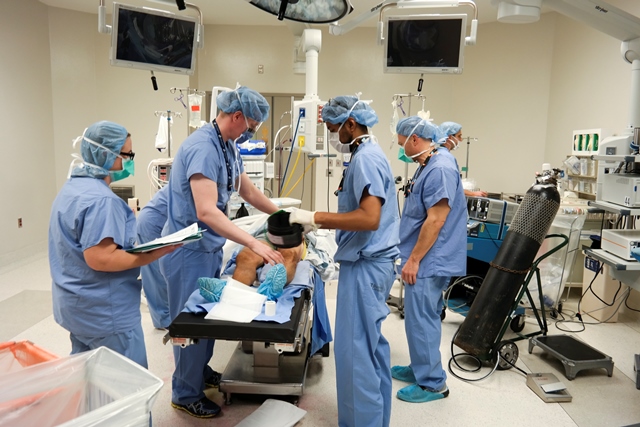By Atifa Hamir and Sarah Warr
There were more than 27,000 knee replacement surgeries done in Ontario in 2016, giving many patients relief from debilitating pain and improving their overall quality of life. However, these surgeries can be both time consuming and expensive, requiring patients to stay in the hospital for days after a procedure with significant costs to the healthcare system. A new outpatient joint replacement surgery program at Women’s College Hospital (WCH) is alleviating this burden on both patients and the healthcare system through a same-day service which allows patients to recover at home after a joint replacement surgery, while staying connected to their healthcare team using virtual technology.
“The average length of stay for patients in a hospital after they’ve had a knee replacement surgery is up to three days,” says Dr. David Urbach, chief of surgery at WCH and co-lead of the program. “By changing these joint replacement surgeries from inpatient procedures to same-day procedures, we have the potential to transform the healthcare system by decreasing our dependence on inpatient hospital beds, improving wait times, reducing costs and make the system more sustainable.”
The program, which was in development for more than a year, uses a combination of state-of-the-art surgical techniques and virtual care apps. Patients are in contact with their healthcare team including nurses, physiotherapists and physicians, both before and after their surgery. Prior to their procedure, they attend a preadmission appointment where they are advised of what to expect during the post-operative period and are informed of devices that can make their at-home recovery easier such as a tablet-based app that is used by the patient at home during the recovery process.
Giving patients the right information, at the right time, on a mobile device
Shortly after a patient is out of surgery, they are assisted by a nurse and physiotherapist to first move into a seated position with their knee bent, stand, walk with a walker and finally navigate a small set of stairs with crutches. They are then discharged home, where their healthcare team can monitor their progress through the app. The app allows the patient to video call with their care provider and log important information that the provider can see, such as the levels of pain and/or nausea they may be experiencing.
“The ability to provide this care at home in real time enhances the patient experience and allows them to recover in their own familiar environment,” says Victoria Noguera, director, perioperative services and gynecology, WCH. “Through the post-op care app, patients have easy access to their physician and nurse practitioner, especially in the first three days at home when they may have more questions or concerns.”
On April 9, Greg Nemez, a 56-year-old real estate agent, became the fifth patient to undergo a knee joint replacement procedure through the program.
Prior to his surgery, Nemez, a lifelong athlete, experienced severe pain and arthritis due to an old football injury. His arthritis continued to get progressively worse leaving him unable to fully straighten his leg and with pain that radiated through his leg with each step.
Nemez’s active lifestyle was one of the factors that made him an ideal candidate for the pilot project. Other than his arthritis pain, he is a very healthy individual who was motivated to get out of the hospital and recover as quickly as possible. Nemez had previous operations on his knee before where he was kept in a full cast to recover, so he was eager to participate in this unique procedure.
“Going from being a very active person to having to reduce my activity because of the pain has been very frustrating,” explained Nemez. “I’m excited to start working on the next steps of my recovery at home.”
Nemez was discharged less than four hours after his procedure and kept in touch with his care team at home through an app which allowed him to log his pain and nausea levels. His experience, and the experiences of patients who preceded him, have demonstrated the many merits of the program to other care providers and patients alike.
“This program is truly living up to WCH’s commitment to providing innovative care and keeping patients out of the hospital,” says Dr. Urbach. “We hope this program will be a model for other hospitals across Canada.”
Atifa Hamir and Sarah Warr work in communications at Women’s College Hospital/Women’s College Research Institute.


